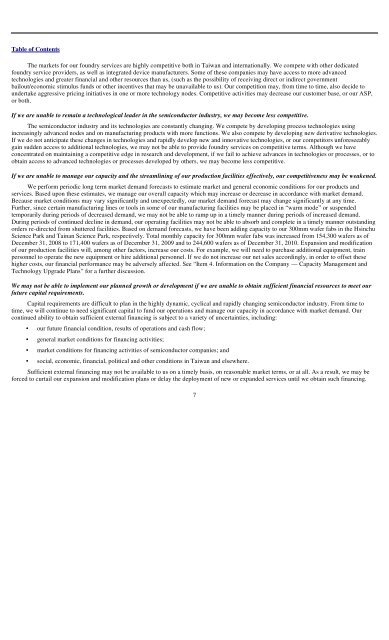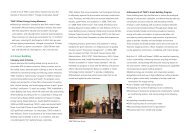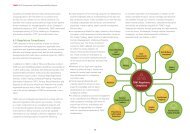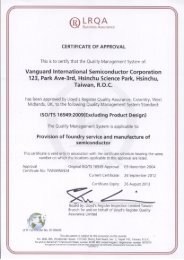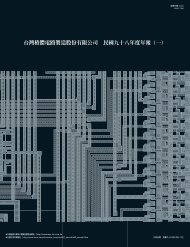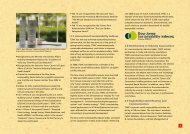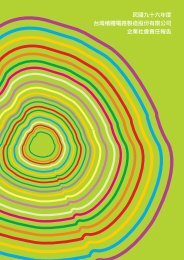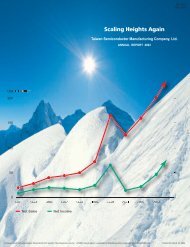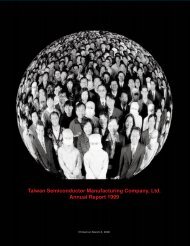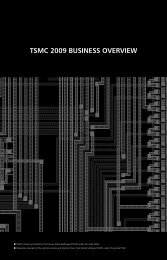Form 20-F Filings with U.S. SEC (4/15/2011) - TSMC
Form 20-F Filings with U.S. SEC (4/15/2011) - TSMC
Form 20-F Filings with U.S. SEC (4/15/2011) - TSMC
- No tags were found...
Create successful ePaper yourself
Turn your PDF publications into a flip-book with our unique Google optimized e-Paper software.
Table of Contents<br />
The markets for our foundry services are highly competitive both in Taiwan and internationally. We compete <strong>with</strong> other dedicated<br />
foundry service providers, as well as integrated device manufacturers. Some of these companies may have access to more advanced<br />
technologies and greater financial and other resources than us, (such as the possibility of receiving direct or indirect government<br />
bailout/economic stimulus funds or other incentives that may be unavailable to us). Our competition may, from time to time, also decide to<br />
undertake aggressive pricing initiatives in one or more technology nodes. Competitive activities may decrease our customer base, or our ASP,<br />
or both.<br />
If we are unable to remain a technological leader in the semiconductor industry, we may become less competitive.<br />
The semiconductor industry and its technologies are constantly changing. We compete by developing process technologies using<br />
increasingly advanced nodes and on manufacturing products <strong>with</strong> more functions. We also compete by developing new derivative technologies.<br />
If we do not anticipate these changes in technologies and rapidly develop new and innovative technologies, or our competitors unforeseeably<br />
gain sudden access to additional technologies, we may not be able to provide foundry services on competitive terms. Although we have<br />
concentrated on maintaining a competitive edge in research and development, if we fail to achieve advances in technologies or processes, or to<br />
obtain access to advanced technologies or processes developed by others, we may become less competitive.<br />
If we are unable to manage our capacity and the streamlining of our production facilities effectively, our competitiveness may be weakened.<br />
We perform periodic long term market demand forecasts to estimate market and general economic conditions for our products and<br />
services. Based upon these estimates, we manage our overall capacity which may increase or decrease in accordance <strong>with</strong> market demand.<br />
Because market conditions may vary significantly and unexpectedly, our market demand forecast may change significantly at any time.<br />
Further, since certain manufacturing lines or tools in some of our manufacturing facilities may be placed in “warm mode” or suspended<br />
temporarily during periods of decreased demand, we may not be able to ramp up in a timely manner during periods of increased demand.<br />
During periods of continued decline in demand, our operating facilities may not be able to absorb and complete in a timely manner outstanding<br />
orders re-directed from shuttered facilities. Based on demand forecasts, we have been adding capacity to our 300mm wafer fabs in the Hsinchu<br />
Science Park and Tainan Science Park, respectively. Total monthly capacity for 300mm wafer fabs was increased from <strong>15</strong>4,300 wafers as of<br />
December 31, <strong>20</strong>08 to 171,400 wafers as of December 31, <strong>20</strong>09 and to 244,600 wafers as of December 31, <strong>20</strong>10. Expansion and modification<br />
of our production facilities will, among other factors, increase our costs. For example, we will need to purchase additional equipment, train<br />
personnel to operate the new equipment or hire additional personnel. If we do not increase our net sales accordingly, in order to offset these<br />
higher costs, our financial performance may be adversely affected. See “Item 4. Information on the Company — Capacity Management and<br />
Technology Upgrade Plans” for a further discussion.<br />
We may not be able to implement our planned growth or development if we are unable to obtain sufficient financial resources to meet our<br />
future capital requirements.<br />
Capital requirements are difficult to plan in the highly dynamic, cyclical and rapidly changing semiconductor industry. From time to<br />
time, we will continue to need significant capital to fund our operations and manage our capacity in accordance <strong>with</strong> market demand. Our<br />
continued ability to obtain sufficient external financing is subject to a variety of uncertainties, including:<br />
• our future financial condition, results of operations and cash flow;<br />
• general market conditions for financing activities;<br />
• market conditions for financing activities of semiconductor companies; and<br />
• social, economic, financial, political and other conditions in Taiwan and elsewhere.<br />
Sufficient external financing may not be available to us on a timely basis, on reasonable market terms, or at all. As a result, we may be<br />
forced to curtail our expansion and modification plans or delay the deployment of new or expanded services until we obtain such financing.<br />
7


